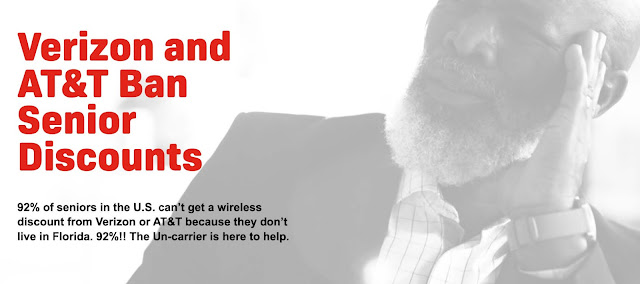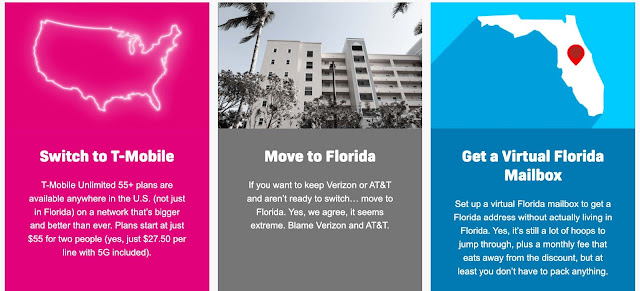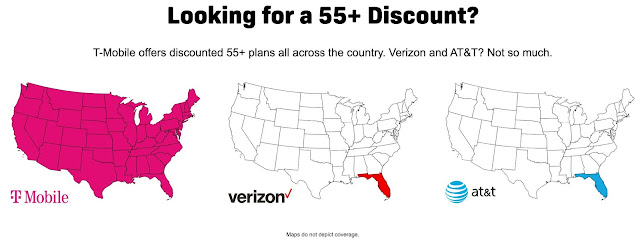AT&T Mobility LLC v. T-Mobile USA Inc., No. 4:22-cv-00760, 2023 WL 311287 (E.D. Tex. Jan. 18, 2023)
T-Mobile’s “Banned Seniors” was a nationwide marketing and
advertising campaign intended to attract customers over the age of fifty-five. Its
website, www.BannedSeniors.com, says
that AT&T “ban[s] senior discounts” outside of Florida. It says “92% of
seniors in the U.S. can’t get a 55+ discount from ... AT&T because they
don’t live in Florida” and offers non-Floridian seniors three options for
obtaining a “55+ Discount”: (1) Switch to T-Mobile; (2) Move to Florida; or (3)
Get a Virtual Florida Mailbox. (After AT&T sued, T-Mobile changed the
website by including “senior” or “55+” before every reference to a “discount.”)
On the website’s map, Florida is the only state in which customers can receive
AT&T’s “discounted 55+ plan,” while T-Mobile is shown offering discounts in
each of the lower forty-eight states.
 |
| "Verizon and AT&T ban senior discounts" website image |
 |
| three options image |
 |
| website graphic |
AT&T’s Unlimited 55+ plan is a “special deal for Floridians 55 and over” where Floridians means “have a Florida billing address.” This is AT&T’s only discount program that is age restricted. But it has a “member savings” program for members of the American Association of Retired Persons (AARP), available to all AARP members irrespective of their age or billing address.
AT&T did not show likely success on the merits of its
Lanham Act false advertising claim and did not receive a preliminary injunction.
The problem was falsity.
AT&T argued literal falsity, which requires a “rigorous”
showing. Mixing several circuits’ standards, the court invoked the Seventh
Circuit’s extreme and not really serious “bald-faced, egregious, undeniable,
[and] over the top” standard as well as the more common “unambiguous” standard.
AT&T argued that it was literally
false to say (1) that AT&T “ban[s]” senior discounts and (2) that “92% of
seniors in the U.S. can’t get a wireless discount from ... AT&T unless they
live in Florida,” given the AARP discount.
T-Mobile rejoined that the AARP discount was a “member
discount” available to all AARP members, rather than a “senior discount,” defined
as a discount that is available to all customers over a threshold age.
At this stage, there were significant factual disputes given
that both parties presented reasonable interpretations of the key terms (1)
“senior discount” and (2) and “ban.”
T-Mobile argued that a senior discount is one that is
“available to all consumers over a threshold age” and pointed to several other
businesses who advertise senior discount programs as “discounts that are
available to any person over a specified age.” This interpretation was reasonable
“because the term itself necessarily implies that age, rather than membership
in any organization, is the sole quality that defines eligibility for the
discount.”
AT&T argued that a “senior discount” is simply “a
discount available to seniors,” and its AARP discount meets this definition,
but that wasn’t the only reasonable interpretation.
Likewise, “ban” could mean “prohibit” as AT&T argued,
and AT&T does not prohibit anyone from receiving its Unlimited 55+
discount—it simply does not offer the discount outside of Florida. T-Mobile argued
that “ban” also means to “refuse to allow.” This was not “unambiguously false.”
In context, the challenged website statements, including the graphics, could be
reasonably interpreted “as merely stating that AT&T chooses not to offer
its Unlimited 55+ plan—its only discount that is available to all consumers
over a threshold age—outside of Florida. This statement is objectively true.”
AT&T also argued that the statements conveyed the
message that AT&T bans seniors from obtaining “any wireless discounts” But
the modifications include the term “senior” or “55+” before every reference to
a “discount,” preventing an unambiguous message that seniors are categorically
ineligible for any AT&T discounts. Plus, this was an implicit falsity
argument, because it required consumers to “make the inferential leap that
AT&T categorically excludes seniors from all discount programs.”
No comments:
Post a Comment